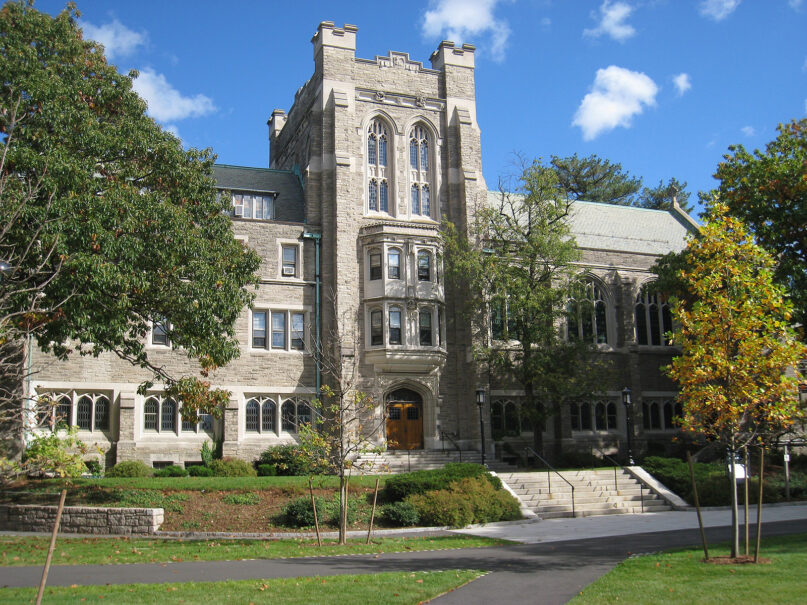
(RNS) — Harvard University is suing the Trump administration over its accusations that the Ivy League school has failed to keep Jewish students safe by allowing antisemitism to flourish.
But over the past few months, the university has quietly gutted a Harvard Divinity School program that its own antisemitism investigation found was critical of Israel and may have been biased against Jewish students.
Harvard Divinity School had already paused its Religion, Conflict and Peace Initiative and terminated the positions of all its teaching staff — among them an assistant dean who was Muslim American, as well as the associate director of the Religion, Conflict and Peace Initiative, a Palestinian American woman.
Now it has also eliminated three more positions in the larger Religion and Public Life program at Harvard Divinity School. The latest cuts, all support staff in charge of communications and content creation, have left only a shell of a program with none of its original leaders who founded the program in 2020.
In a May 30 email, Harvard Divinity School Dean Marla Frederick informed school staff that “a number of Religion Public Life team members were informed that their term appointments ending June 30 will not be renewed.” She did not identify names or positions cut.
A Harvard spokesperson confirmed to RNS that “three term-limited appointments for the RPL program will not be renewed when those terms conclude on June 30.”
A former staffer speaking off the record because she is still employed until the end of the month said only one support staff person was allowed to stay an additional year and another was allowed to stay for a three-month extension.
A new permanent director of Religion and Public Life — Terrence L. Johnson, a professor of African American religious studies — will begin in the new academic year.
RELATED: Harvard Divinity School pauses religion and conflict educational initiative, cuts its staff
While the divinity school has tried to reassure students the program would continue, many said they were devastated at its apparent dismantling and unsure what it would look like in the future.
“It’s been really disheartening,” said Carolyn Jones, a student in the Religion in Public Life program who is also working toward a Master of Divinity degree. “It’s also been really disabling to my understanding of my own academic trajectory at the divinity school. I don’t know what will happen to the RPL program. I don’t know if I will get my certificate at the end of next year.”
Religion and Public Life was one of a handful of programs singled out in Harvard’s 311-page antisemitism report issued in April as being especially problematic. The report found “a lack of balance and a pattern of demonization towards Jews and Israelis within RPL’s activities.”
The report cited a statement put out by five Religion and Public Life staff after the Oct. 7, 2023, Hamas attack on Israel that killed 1,200 people, which the report’s authors found egregious. While the statement called the Hamas attack “horrendous,” it also tried to set the attack within the context of Israel’s occupation of Palestinian lands and its long-standing blockade of Gaza:
“When these ‘decades of oppression’ are left out of the story about Hamas’ horrendous attack on Israeli civilians, a narrative about an ‘innocent’ state of Israel’s right to ‘defend’ itself against ‘unprovoked’ aggression is legitimized. The reality is much more complex, and that complexity must be confronted if there is any chance to avoid endless cycles of dehumanization, destruction, and death,” the five faculty members wrote.
The report and the subsequent gutting of the Religion in Public Life program is now being criticized by a group of 27 Jewish scholars of Jewish studies who say Harvard’s claims about campus antisemitism misrepresent Jewish diversity and views about Israel.
In an editorial in The Guardian on Thursday (June 12), the Jewish scholars said they filed an amicus brief in support of Harvard’s lawsuit against the Trump administration intended to preserve billions of dollars in federal research funding. But the group thinks Harvard itself was discriminatory in its attempts to deal with antisemitism.
“We reject Harvard’s troubling assumption that being Jewish necessitates supporting Israel, or that criticism of Israel’s genocide in Gaza constitutes antisemitism,” the Jewish scholars wrote.
In January, Harvard agreed to adopt the controversial International Holocaust Remembrance Alliance’s definition of antisemitism when investigating complaints. Critics say the definition has often been misused to protect Israel from legitimate criticism.
The Jewish scholars said Harvard may have violated Title VI of the Civil Rights Act by subjecting Jews to stereotypes about what constitutes “authentic” Jewish identity.
Students and recent graduates of the Religion and Public Life program said they felt the university was unjustly punishing the program.
Sara Smirin, a Jewish student who graduated in 2024 and was there during the unrest after the Oct. 7 attack, said that while Jewish students may have felt uncomfortable at some protests, the Religion and Public Life program never made her feel unsafe or unsupported. She wrote her thesis on being Jewish in the United States.
“The program itself is probably the only place that engaged and explored the really tough moral questions that Oct. 7 and the ongoing conflict in Israel and Palestine posed,” Smirin said. “The divinity school eliminated the one program focused on peace building in Israel and Palestine at the moment when it was most relevant.”
Religion News Service is currently participating in the Religion and Public Life’s internship program.





